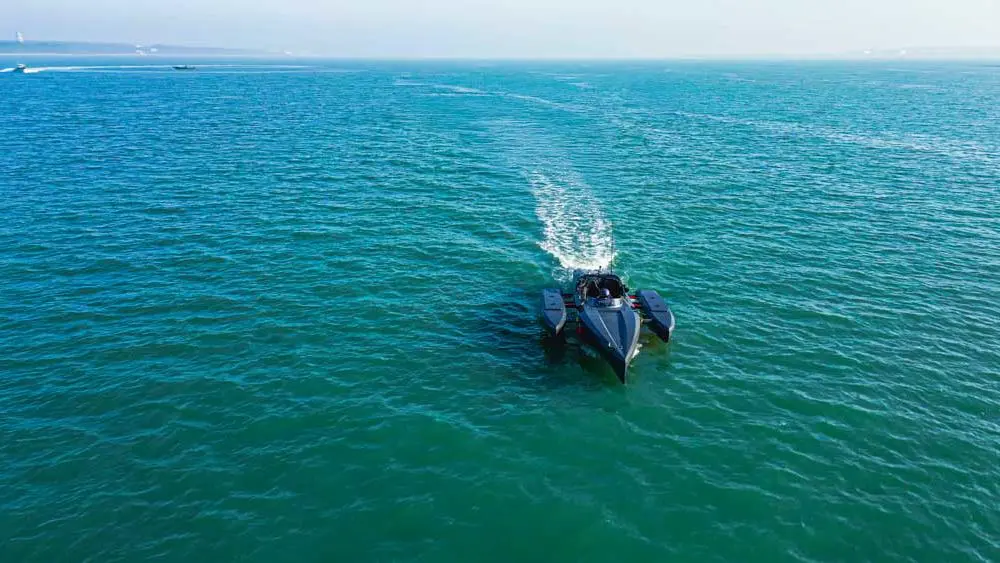
University helps power maiden voyage of wind-assisted tanker with world-first training
Southampton Solent has partnered with Union Maritime Limited to help make green travel easier
15 April 2025
28 March 2025 • by Solent press team
A new cost-effective, zero-emissions solution for high-speed passenger ferries enters sea trials thanks to an innovative industry-led collaboration between Southampton Solent University, Chartwell Marine and Newcastle Marine Services.
Representatives from Chartwell Marine and Solent University introduced the electric foiling high-speed trimaran demonstrator to industry leaders, academics and policymakers at the Coastal Powerhouse Conference in Southampton, this week.
The project has been supported by a £1.86 million UK Government grant – awarded under the Clean Maritime Demonstration Competition Round 3 (CMDC3). The funding has been used to develop and build a scaled demonstrator vessel, which aims to test a simpler, cost-effective, zero-emission foiling ferry concept
Featuring a lightweight trimaran hull, a fixed main foil, and actuating foiling rudder, the design reduces energy consumption and power demand while maintaining speed.
The energy-efficient layout places the batteries in the sponsons, away from passenger areas, enhancing safety and maximising space onboard.
Solent University Project Lead, Associate Professor of Marine Sustainability, Dr Laurie Wright, says, “This project is not only advancing energy efficiency but also offering a practical and scalable solution for the maritime sector's transition to zero emissions. It’s important that we prioritise sustainability and green energy in the sector and I’m very excited that we’re able to see the test vessel in the water already.”
The month-long sea trial will provide data on the vessel’s handling, efficiency, and performance across various sea and weather conditions, to determine the TriFoiler’s suitability for commercial operations – one that has the potential to transform short coastal, high-traffic passenger routes, such as the Solent.
Andy Page, Managing Director of Chartwell Marine says, “Given that electric power has a lower energy density compared to traditional fuels, minimising energy usage is crucial for achieving optimal results. Finding the balance between efficiency and reliability is key. We are very excited about the TriFoiler concept, which has been made possible through our partnership with Solent University and the support of Innovate UK funding. We look forward to sharing our findings later this year.”
The findings from the trial will be shared at the end of April, informing the next stage of development, moving towards a full-scale, 24-metre, 40-passenger foiling ferry capable of speeds up to 28 knots.
Neale Ryan, Head of Land and Maritime Transport at Innovate UK, said: “The TriFoiler project embodies what CMDC was created for — demonstrating practical, scalable clean maritime technologies in real world conditions. These trials advance the industry’s understanding of foiling technology and its potential to reduce emissions, improve operational efficiency and support the decarbonisation of the maritime industry.”
The vessel could eventually be used for commercial operations on Southampton water, and future versions sold into the wider fast ferry market, both in the UK and abroad.
-ENDS_
This project is funded by UK Government through the UK Shipping Office for Reducing Emissions (UK SHORE) programme in the Department for Transport. UK SHORE has allocated over £200m since 2022 to develop the technologies necessary to decarbonise the UK maritime sector and capture the economic growth opportunity of the transition. Innovate UK, part of UK Research and Innovation, is the main delivery partner for UK SHORE interventions.
